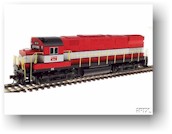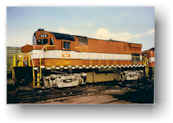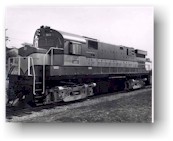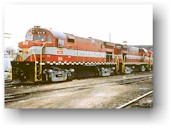|
Home
|
DETAILING THE ATLAS HO SCALE GB&W ALCO C-424
Ideas for detailing the new Atlas HO scale Green Bay & Western Alco C-424 model to more closely reflect the prototype. Thank you to everyone who helped on this project - especially Greg Castora and Keith Meacham for their comments.
Index |
Parts List |
- The Atlas C-424/425 Model
- Improving the Atlas C-424 Model
- Reference Material
- Alco's C-424/425 Production
- GB&W C-424 Roster
- Photos
- Models
- Prototypes
- Parts List
The Atlas C-424/425 Model |
Index Parts List |
Atlas Model Railroad Co. retooled their HO Alco C-424/425 locomotive with a five-pole motor with dual flywheels, separately-applied wire grab irons and ladders, working drop steps, directional lighting and an NMRA 8 pin DCC plug. The paint looks good and the handrails are very thin. These engines run great -- Atlas quality shines in this department. The locomotives were released in January, 2003.
The Atlas model comes decorated in the GBW red-and-gray paint scheme as #312, #313 or without a number.
More information on the Atlas model is available at the Atlas web site: Atlas HO C-424/5 LOCOMOTIVES
Improving the Atlas C-424 Model |
Index Parts List |
Here are some specific things which a modeler could do to detail the Atlas GB&W C-424 model. They are listed beginning with the easiest and most effective improvements.
- Sill Stripes and Nose Herald
- Cab and End Numbers
- Gray Trucks
- All-Weather Windows
- Cab Roof Details
- Fuel Tank and Air Reservoir
- Drop Steps
- Dynamic Brakes and Other Vents
- Other Details
Sill Stripes and Nose Herald |
Index Parts List |
The Atlas model does not have checkerboard stripes on the side sill nor a GREEN BAY ROUTE herald on the nose.
When the locomotives were delivered from Alco they did not have these items. However, they were added by GB&W forces immediately upon arrival. So although the Atlas model may be true to the builders photos in this regard, the stripes and nose herald should have been added by Atlas to properly reflect how the locos looked while in service.
Then again, those things are easier to add than to remove from a model...
Checkerboard sill stripes and nose heralds are available from the following decal sources:
- Scale Rail Graphics (GBW Locomotives set #31010-HO)
- DM Custom Decals (GBW Diesel Hood Unit set #1 HO.)
Cab and End Numbers |
Index Parts List |
As delivered
When delivered, the GB&W C-424s had small 2" or 3" yellow engine numbers on the cab sides and the end of the short hood. The end of the long hood had the ownership ("G.B.& W" or "K.G.B.&W") and loco number in the same small yellow lettering on two lines.
There were exceptions as time went on; for example by February, 1966 #312 no longer had a number on the low nose.
The Atlas model does not have numbers on the cab sides. It does have small yellow numbers on the short hood and "GB&W" in small yellow letters on the end of the long hood.
For the as-delivered lettering scheme use the 4" lettering from Microscale Industries set 90-106 (Gothic Railroad Yellow Alphabet and Numbers) to add the engine number to the cab sides and the long hood.
Late 1960
By 1967 the cab sides and low nose carried the engine number in larger 6" lettering. The rear of the locomotives still kept the yellow railroad initials and cab number.
The white numbers on the cab sides and end of the short hood can be added from either Scale Rail Graphics set #31010 (GBW Locomotives) or DM Custom Decals set #1 (GBW Diesel Hood Unit). The factory applied yellow numbers on the end of the short hood will have to be removed first. The long hood end should get the 4" numbers from Microscale set 90-106, as described above.
Gray Trucks |
Index Parts List |
The model's trucks are stock black plastic, but the GB&W had gray trucks on their red-and-gray locomotives. Match the gray of your favorite brand of paint. Testors Camouflage Gray is a good match.
All-Weather Windows |
Index Parts List |
The GB&W used all-weather windows on their locos; the Atlas model does not have them. Detail Associates all-weather cab window is a very good match. Paint them red to match the cab.
Cab Roof Details |
Index Parts List |
Air horns
The air horns on the model are standard Atlas stock and are placed on the fireman's side of the cab roof (the left side when looking forward).
The GB&W used Nathan P3 horns centered on the cab roof. Nathan P3 horns are available as separate details from a number of suppliers (Detail Associates #1603, Cal Scale Shops #420, among others) and can be mounted facing forward in new hole centered on the cab roof. Fill in the original mounting hole and touch up the black paint.
Roof beacon
Sunrise Enterprises part H-136 is a match for the strobe lights used by the GB&W into the early 1980s. The base and cap of the strobe were originally red, but quickly turned black from an accumulation of diesel soot.
Details West part RB-306 will be available soon. It is patterned after the Pyle National strobes used by the GB&W.
Fuel Tank and Air Reservoir |
Index Parts List |
The Atlas C-424 models come with a large fuel tank with rounded sides, while the prototype GB&W locomotives had smaller fuel tanks. However the rounded sides of the fuel tanks can be removed easily and the holes filled with model putty.
The air reservoir must be cut from the tank casting as they are molded together. Some minor sanding is required to remove any flash or rough edges and then the reservoir can be glued directly to the underside of the running board.
Drop Steps |
Index Parts List |
The models come with beautiful drop steps that actually work. Unfortunately the GB&W locos didn't have drop steps when they were in the red and gray paint scheme. The steps are easily removed. You can go the extra mile and add in a piece of suitable wire for a safety chain across the opening for the steps.
Dynamic Brakes and Other Vents |
Index Parts List |
The Atlas model has a standard dynamic braking grid on the roof. GB&W's 1960s fleet of C-424s did not have dynamic brakes. To be true to prototype the grid needs to be removed. This requires a lot of delicate work. (The second-hand C-424s which GB&W acquired in 1980 had the dynamic brake grid).
The forward two of the three vents along the top of the hood under the dynamic brake grid needs to be removed; GB&W 311-314 only had the rear vent in this location. This changed over time: see the February 12, 1966 image of GBW #312 with all vents covered.
GB&W 312-314 had a vented door on each side next to the radiator intake near the top rear -- similar to C-425 locomotives. This would be a difficult detail to add to the locomotive.
Other Details |
Index Parts List |
A few other detail parts that can be used to improve the model include:
Detail Associates bell underframe mount.
Details West sand filler hatches - The one molded on the short hood of the Atlas C-424 is a little on the small side.
Details West loco & cab step lights.
Detail Associates exhaust stack -
Detail Associates exhaust stack (modified) - Photo evidence indicates that GBW #312 had a silver colored raised exhaust stack.� It is unclear if the other C-424s did also. Greg Castora modeled his stack by filing off approximately 4 scale inches from the bottom of the 10 inch tall Detail Associates part. He wrapped the modified part with styrene to get a stack which measured a scale 11 inched by 27 inches.
Reference Material |
Index Parts List |
Alco's C-424 Production |
Alco built 190 C-424 locomotives between April 1963 and May 1967. In addition, 91 of the externally similar C-425 locomotives were produced between October 1964 and December 1966.
Railfans have identified three general "phases" of Alco's C-424 production, each noted by slight variations in the arrangement of details such as number boards, headlights, and battery boxes.
Specific spotting features of each phase include:
- Phase 1: (production dates 1963 through mid-1964)
GB&W #311- Rear number boards overhang the car body
- Engine air intake near the radiator are two horizontal openings
- Battery box is under the left walkway in the rear
- Phase 2: (production dates mid-1964 through early 1965)
GB&W #312, #313- Rear number boards notched into the car body
- Engine air intake near the radiator is one vertical opening
- Battery box is under the cab
- Phase 3: (production dates early 1965 through 1967)
KGB&W #314- Rear number boards notched into the car body
- Engine air intake near the radiator is one vertical opening
- Battery box is under the cab
The Atlas model represents an early phase 2 production with rear number boards that are notched into the car body, yet retaining the two horizontal air intakes openings of the phase 1 production.
The GB&W C-424 Roster |
Index Parts List |
The GB&W added four C-424 locomotives to its roster during the early 1960s. They all had the red-and-gray paint scheme of the Atlas model.
GB&W #311 was delivered in April 1963, followed by GB&W #312 and #313 in July 1964 and January 1965 respectively. The final #314 was delivered and assigned to the KGB&W in September 1965. All four locomotives remained on the GB&W roster until the end of operation in 1993.
The engines were primarily used in pairs on Trains 1 and 2, the fast freight trains which operated daily and connected the car ferries of Lake Michigan with western rail connections at Winona, Minn. They replaced the aging FA-1 fleet which were traded in to Alco one at a time as the C-424s were purchased.
The red-and-gray paint scheme was standard for all GB&W locomotives in the 1960s. The C-424 fleet kept that paint scheme until they were repainted in the simplified all-red scheme about 1972 (the earliest photo that I've seen of a C-424 in the all-red paint scheme is #314 in November, 1972).
Four additional C-424s joined the roster in 1980. They were ex-Conrail (originally Pennsylvania, Erie-Lackawanna, Reading) locomotives remanufactured by General Electric in Hornell, N.Y. These four locomotives never had the red-and-gray paint scheme used by Atlas on their C-424 model.
Photos |
Index Parts List |
- Models
- Prototypes
- #311 Builders Photo 1963
- #311 at Wisconsin Rapids October 12, 1965
- #312 at Wisconsin Rapids February 12, 1966
- #313, #312, and an RS unit idle away at Wisconsin Rapids March 14, 1967
- #312 still displays vintage colors at Wisconsin Rapids 1969
- #314 May 30, 1969
- #313 at Norwood Yard September 16, 1972
Parts List |
Index Parts List |
Here are sources for detail parts mentioned in this article.
| Detail | Manufacturer | Part No. | Description |
| Sill checkerboard, nose herald, white engine numbers | DM Custom
Decals Manitowoc, WI |
#1 (HO) | GBW Diesel Hood Unit decal set |
| Scale
Rail Graphics Wausau, WI |
#31010 HO | GBW Locomotives decal set | |
| Yellow engine numbers | Microscale
Industries Inc. Fountain Valley, CA |
90-106 | Gothic railroad yellow alphabet and numbers decal set |
| Nathan P3 horn | Detail
Associates San Luis Obispo |
229-1603* | Air horn Nathan P3/P5 |
| Cal
Scale Shops Montoursville, PA |
190-420* | Nathan Diesel Air Horn (Brass Casting) | |
| Roof strobe light | Sunrise
Enterprises Doyle, CA |
H-136 | Safety Beacon |
| Details
West Walnut, CA |
235-306 * | Pyle National Rotary Beacon | |
| All-weather window | Detail
Associates San Luis Obispo |
229-2301* | All-Weather Cab Window |
| Bell | Detail
Associates San Luis Obispo |
229-1202* | Bell Underframe Mount 2/ |
| Sand hatch | Details
West Walnut, CA |
235-202 * | Sand Filler Hatches |
| Engine step lights | Details
West Walnut, CA |
235-172 * | Loco & Cab Step Lights |
| Exhaust stack | Detail
Associates San Luis Obispo |
229-2401 * | Exhaust stack |
* Walthers catalog number
Copyright � 2003 Mark Mathu
[ Top of This Page
]
The Green
Bay Route is maintained by Mark
Mathu.
Visit the Guest Book or send
comments to mark@mathu.com.
![]() Updated April 15, 2012
Updated April 15, 2012
|



